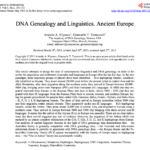Name of the article and its coordinates
Dima Kortukov. “The Politics of Pseudoscience: Power and Knowledge in Contemporary Russia.” Problems of Post-Communism, 2023.
What’s the argument?
The Russian government has developed a symbiotic relationship with the country’s pseudoscientific community. State authorities integrate pseudoscience—that is, theories and beliefs that look superficially like science, but are in some way “false, misleading, or unproven”—into their propaganda efforts; Russians who peddle pseudoscience wrap their claims in anti-Western rhetoric in order to achieve official recognition. Examples include Anatole Klyosov and his “DNA genealogy” and Irina Ermakova’s campaign against genetically modified (GM) organisms.
Why should we care?
Russian pseudoscientists helped develop, and provided support for, the false narrative that the United States was developing bioweapons at Ukrainian facilities. Appearing on Russia’s ultra-conservative Tsargrad TV channel, Ermakova claimed that Ukrainian researchers modified pathogens so that they would affect only a certain ethnic group; she also asserted that migratory birds could be used to spread these pathogens into Russia.
These claims received enthusiastic support from Russia’s officials, including prominent legislators and Foreign Minister Sergey Lavrov. Russian authorities helped spread these claims internationally. During February 2022, the hashtag #USBiolabs began to trend on Twitter. Numerous accounts—some associated with QAnon—amplified the false narrative Russia invaded Ukraine in order to destroy American-installed biolabs that were engaged in the production of deadly diseases. Some Twitter users went even further, claiming that Russia is attacking Ukraine to prevent a ‘Covid-2’ bioweapon from being released.
This episode is but one example of the Kremlin’s growing use of pseudoscience for political ends. Those include not only international disinformation campaigns, but also in its science and education policies.
Why will we find it persuasive?
I employ a multidisciplinary approach that draws on the sociology of Robert Merton and Michele Foucault reading of power/knowledge relations. I use thick description to analyze “DNA genealogy” and the Russian anti-GM movement and explore how they have been received by other scholars and the broader public.
Why did you decide to write it in the first place?
As a scholar of Russian politics and society, I was fascinated by the fact that Russia—a country with a history of impressive scientific achievements—is experiencing a renaissance of pseudoscience. Many of those who promote pseudoscientific theories are popular lecturers; the Russian media accords the the status of scientific experts. Many members of the Russian government, including in Putin’s Presidential Administration, embrace pseudoscientific theories. I thought these developments were overdue for academic analysis.
What would you most like to change about the article, and why?
While working on this article, I found myself going down the rabbit hole of Russian pseudoscience. Earlier versions of the article reviewed the rather unorthodox theories of Peter Garyaev and Vladimir Zhdanov. Garyaev’s Wave Genetics holds that DNA molecules are capable of perceiving information from human voices. Zhdanov advocates for total abstinence from alcohol use; according to him the international alcohol industry wages “an alcoholic genocide” against Russia. Unfortunately, I had to cut this analysis.
How much difficulty did you have getting the article published?
I began the project in 2017, but it took on new significance with Russia’s 2022 invasion of Ukraine. Earlier versions were rejected by several journals. In the end, I had a good experience with the review and editorial process at Problems of Post-Communism.



0 Comments